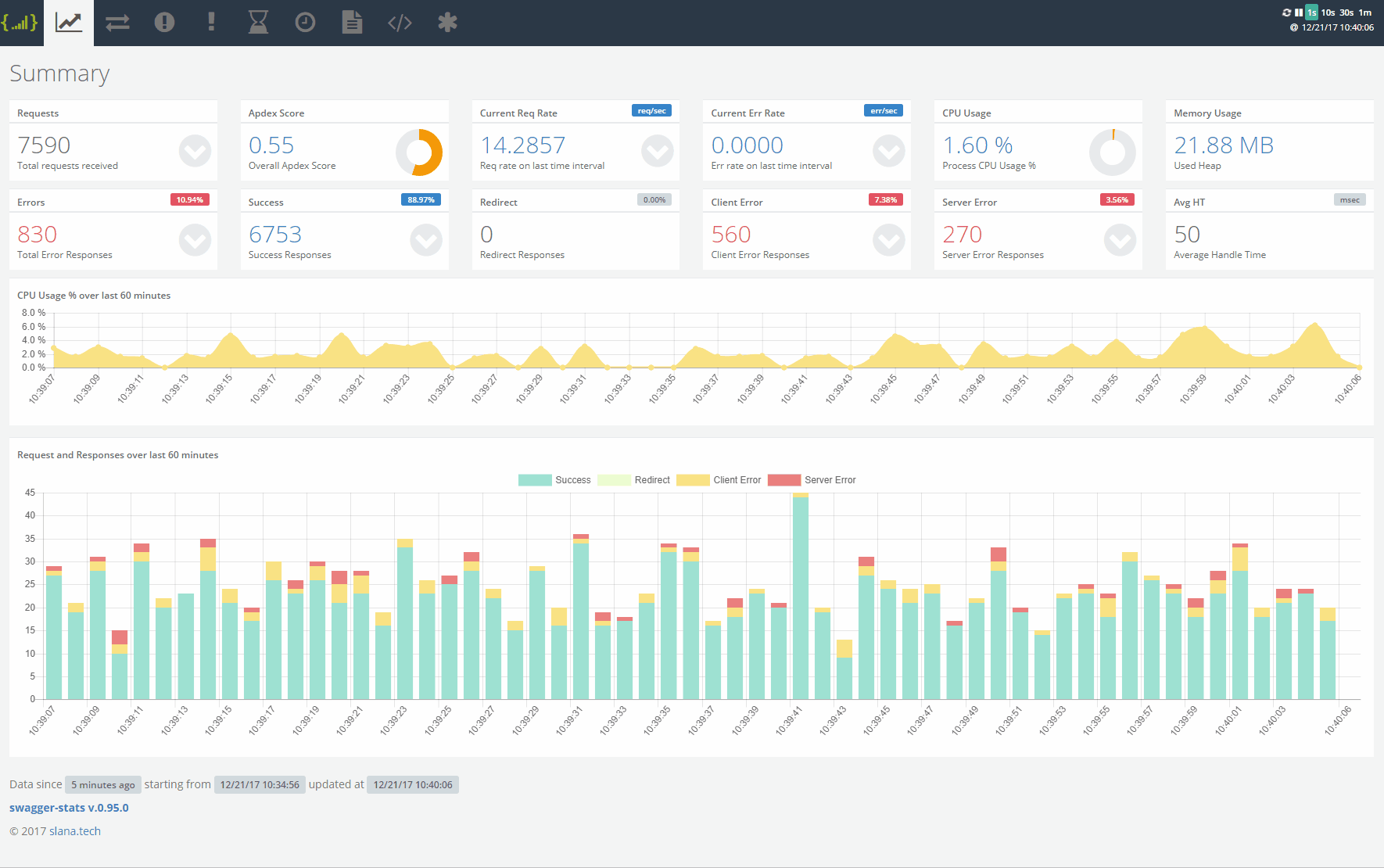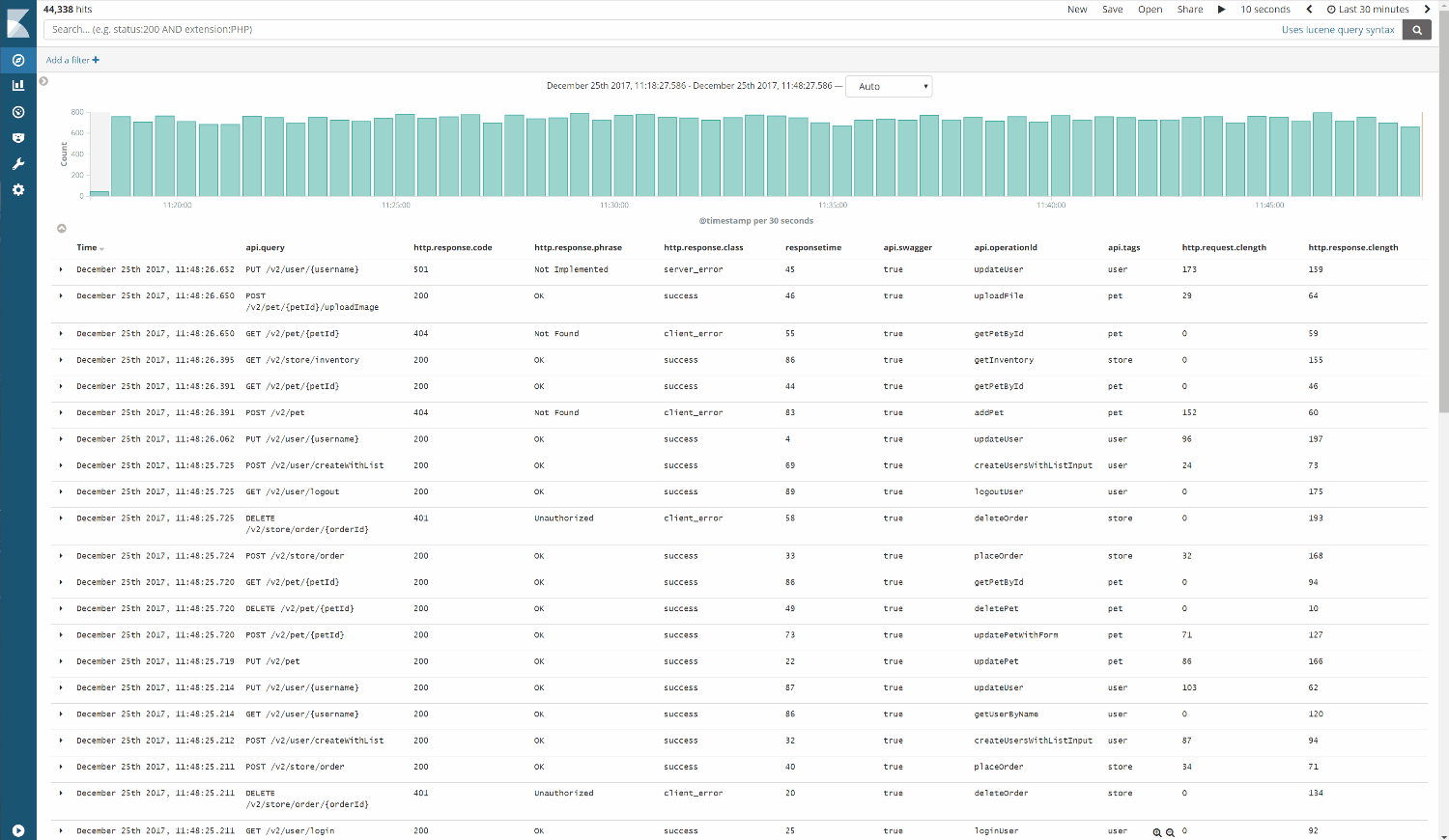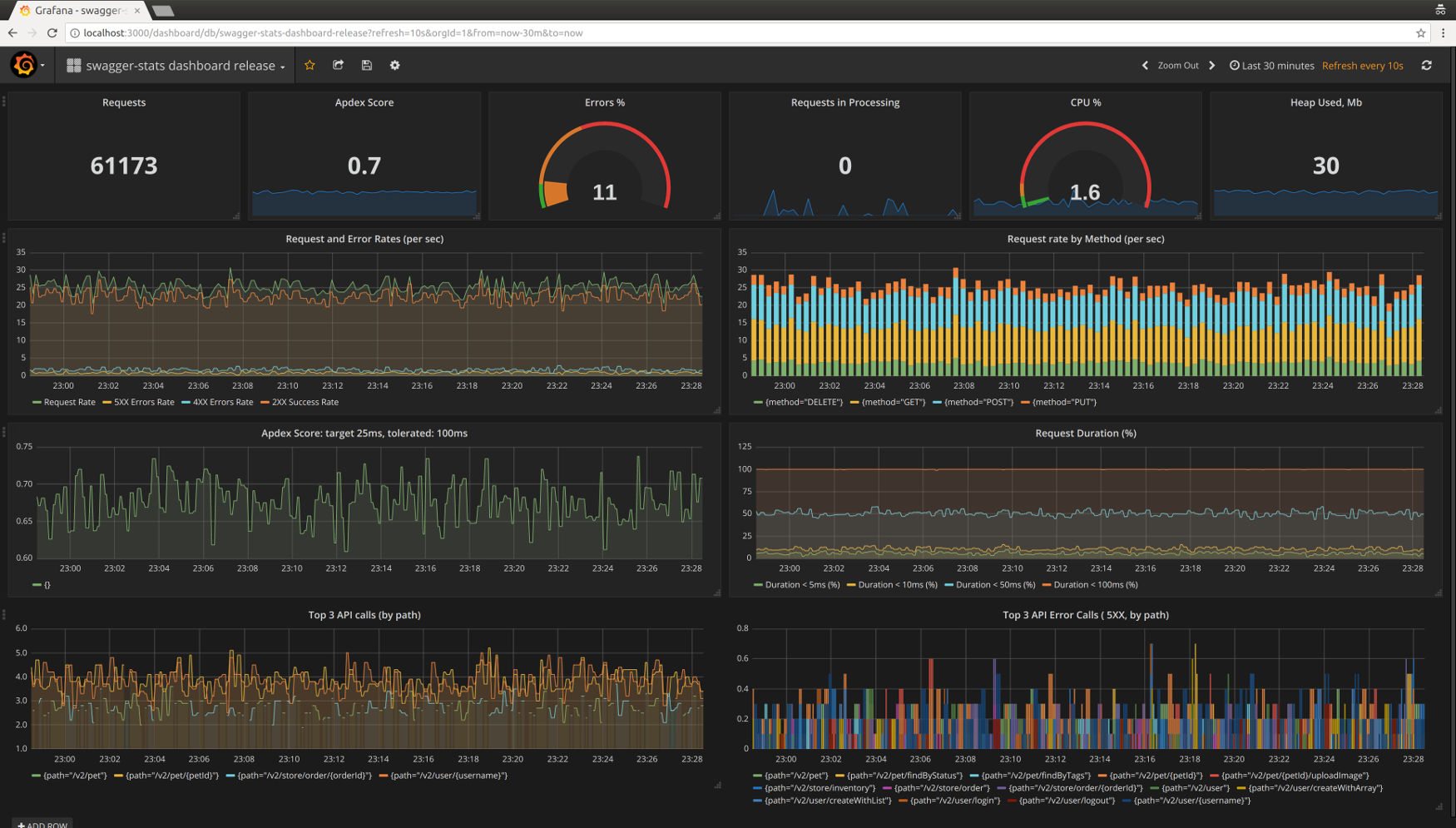swagger-stats-redis v0.5.0
swagger-stats
https://swaggerstats.io | Guide
API Telemetry and APM
Trace API calls and Monitor API performance, health and usage statistics in Node.js Microservices
Supports Express, Fastify, Koa and Hapi
swagger-stats traces REST API requests and responses in Node.js Microservices, and collects statistics per API Operation. swagger-stats detects API operations based on express routes. You may also provide Swagger (Open API) specification, and swagger-stats will match API requests with API Operations defined in swagger specification.
swagger-stats exposes statistics and metrics per API Operation, such as GET /myapi/:parameter, or GET /pet/{petId}
Built-In API Telemetry
swagger-stats provides built-in Telemetry UI, so you may enable swagger-stats in your app, and start monitoring immediately, with no infrastructure requirements. Navigate to
http://<your app host:port>/swagger-stats/ui

API Analytics with Elasticsearch and Kibana
swagger-stats stores details about each request/response in Elasticsearch, so you may use Kibana to perform detailed analysis of API usage over time, build visualizations and dashboards

See dashboards/elastic6 for swagger-stats Kibana visualizations and dashboards
Monitoring and Alerting with Prometheus and Grafana
swagger-stats exposes metrics in Prometheus format, so you may use Prometheus and Grafana to setup API monitoring and alerting

See dashboards/prometheus for swagger-stats Grafana dashboards
With statistics and metrics exposed by swagger-stats you may spot problematic API endpoints, see where most of errors happens, catch long-running requests, analyze details of last errors, observe trends, setup alerting.
swagger-stats provides:
- Metrics in Prometheus format, so you may use Prometheus and Grafana to setup API monitoring and alerting
- Storing details about each API Request/Response in Elasticsearch, so you may use Kibana to perform analysis of API usage over time, build visualizations and dashboards
- Built-in API Telemetry UI, so you may enable swagger-stats in your app, and start monitoring right away, with no additional tools required
- Exposing collected statistics via API, including:
- Counts of requests and responses(total and by response class), processing time (total/avg/max), content length(total/avg/max) for requests and responses, rates for requests and errors. This is baseline set of stats.
- Statistics by Request Method: baseline stats collected for each request method
- Timeline: baseline stats collected for each 1 minute interval during last 60 minutes. Timeline helps you to analyze trends.
- Errors: count of responses per each error code, top "not found" resources, top "server error" resources
- Last errors: request and response details for the last 100 errors (last 100 error responses)
- Longest requests: request and response details for top 100 requests that took longest time to process (time to send response)
- Tracing: Request and Response details - method, URLs, parameters, request and response headers, addresses, start/stop times and processing duration, matched API Operation info
- API Statistics: baseline stats and parameter stats per each API Operation. API operation detected based on express routes, and based on Swagger (Open API) specification
- CPU and Memory Usage of Node process
How to Use
Install
npm install swagger-stats-redis --saveEnable swagger-stats middleware in your app
Express
const swStats = require('swagger-stats-redis');
const apiSpec = require('swagger.json');
app.use(swStats.getMiddleware({swaggerSpec:apiSpec}));Fastify
const swStats = require('swagger-stats');
const apiSpec = require('swagger.json');
const fastify = require('fastify')({
logger: true
});
fastify.register(swStats.getFastifyPlugin, {swaggerSpec:apiSpec});Koa
express-to-koa can be used which is just a simple Promise wrapper.
const swStats = require('swagger-stats');
const apiSpec = require('swagger.json');
const e2k = require('express-to-koa');
app.use(e2k(swStats.getMiddleware({ swaggerSpec:apiSpec })));Hapi
const swStats = require('swagger-stats');
const swaggerSpec = require('./petstore.json');
const init = async () => {
server = Hapi.server({
port: 3040,
host: 'localhost'
});
await server.register({
plugin: swStats.getHapiPlugin,
options: {
swaggerSpec:swaggerSpec
}
});
await server.start();
console.log('Server running on %s', server.info.uri);
};See /examples for sample apps
Get Statistics with API
$ curl http://<your app host:port>/swagger-stats/stats
{
"startts": 1501647865959,
"all": {
"requests": 7,
"responses": 7,
"errors": 3,
"info": 0,
"success": 3,
"redirect": 1,
"client_error": 2,
"server_error": 1,
"total_time": 510,
"max_time": 502,
"avg_time": 72.85714285714286,
"total_req_clength": 0,
"max_req_clength": 0,
"avg_req_clength": 0,
"total_res_clength": 692,
"max_res_clength": 510,
"avg_res_clength": 98,
"req_rate": 1.0734549915657108,
"err_rate": 0.4600521392424475
},
"sys": {
"rss": 59768832,
"heapTotal": 36700160,
"heapUsed": 20081776,
"external": 5291923,
"cpu": 0
},
"name": "swagger-stats-testapp",
"version": "0.90.1",
"hostname": "hostname",
"ip": "127.0.0.1"
}Take a look at Documentation for more details on API and returned statistics.
Get Prometheus Metrics
$ curl http://<your app host:port>/swagger-stats/metrics
# HELP api_all_request_total The total number of all API requests received
# TYPE api_all_request_total counter
api_all_request_total 88715
# HELP api_all_success_total The total number of all API requests with success response
# TYPE api_all_success_total counter
api_all_success_total 49051
# HELP api_all_errors_total The total number of all API requests with error response
# TYPE api_all_errors_total counter
api_all_errors_total 32152
# HELP api_all_client_error_total The total number of all API requests with client error response
# TYPE api_all_client_error_total counter
api_all_client_error_total 22986
. . . . . . . . . . parse redis
default config for redis:
const Redis = require('redis');
const redis = Redis.createClient({ // some config }); ....
const swStats = require('swagger-stats-redis'); swStats.init({
```
pm2: true,
redis,
```});
## custom upload
>reportMCall(service, method, path, http_code, code)
| arg | require | default | description |
| ---- | ---- | ---- | ---- |
| service | true | - | service name |
| method | true | - | http method |
| path | true | - | url path |
| http_code | true | - | http request code |
| code | fasle | 0 | error code |
>### exampleimport * as swStats from 'swagger-stats-redis';
swStats.reportMCall('user', 'GET', '/index', 200, 0);
## Updates
See [Changelog](https://github.com/veonbean/swagger-stats-redis/CHANGELOG.md)
## Enhancements and Bug Reports
If you find a bug, or have an enhancement in mind please post [issues](https://github.com/veonbean/swagger-stats-redis/issues) on GitHub.
## License
MIT